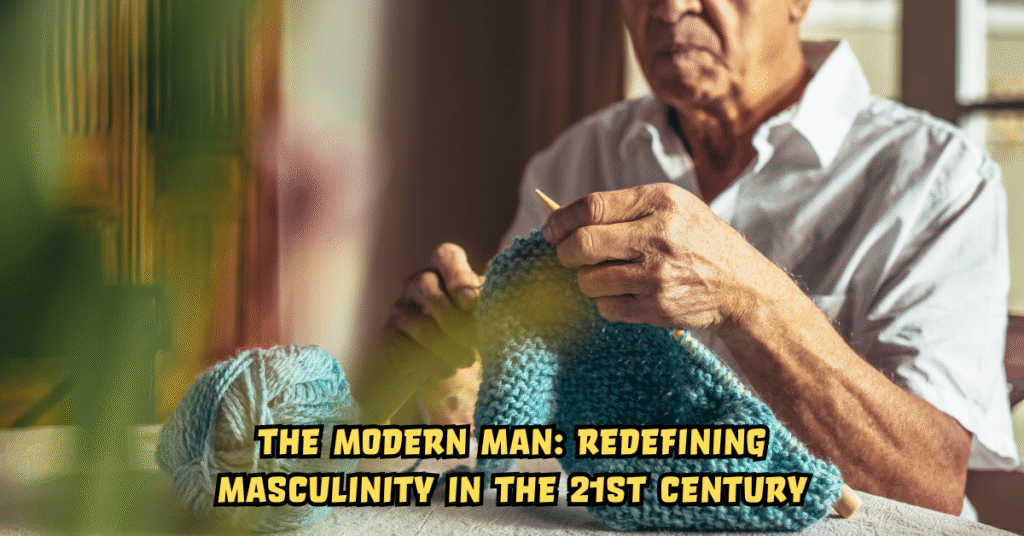The phrase “modern man” carries different meanings depending on who you ask, yet its core reflects how men today live, adapt, and redefine their identities within a rapidly changing world. A century ago, the term suggested breadwinners rooted in traditional roles, but in today’s society, the modern man is measured by far more than his ability to provide. He is expected to balance ambition with empathy, independence with cooperation, and strength with vulnerability. This shift is not a rejection of masculinity but an expansion of it. Within the first glimpse of his lifestyle, it becomes clear that the modern man values equality, self-awareness, adaptability, and holistic well-being. He is not only concerned with how he is perceived by society, but also with how he perceives himself—whether as a partner, a professional, a father, or a citizen of the world.
Historical Context: From Traditional Roles to Modern Identity
To understand the modern man, it is essential to examine how masculinity has evolved over centuries. Historically, men were primarily defined as providers, protectors, and leaders of households. Industrialization reinforced this narrative by tying masculinity to physical labor and financial responsibility. The cultural revolutions of the 20th century—women’s rights, civil rights, and shifting workplace dynamics—challenged these definitions. Today, being a man no longer fits neatly into one mold. The modern man is shaped not just by tradition but by the cultural diversity, technological access, and emotional literacy of his time. Unlike past generations, he must navigate spaces where gender roles are fluid and shared responsibilities are the norm. This context has not erased the old expectations but has layered them with new ones, producing a multifaceted identity that blends tradition with modernity.
Characteristics of the Modern Man
The modern man cannot be boxed into stereotypes; however, certain traits consistently emerge when analyzing his role in society. Self-awareness is one of his defining characteristics, allowing him to acknowledge both his strengths and weaknesses. Emotional intelligence, once sidelined, is now a critical aspect of his identity, enabling him to communicate openly and foster stronger relationships. A willingness to adapt defines him, as careers, family structures, and social environments evolve faster than in previous eras. Importantly, the modern man places value on holistic health—mental, physical, and emotional—recognizing that well-being is essential for long-term fulfillment. His identity is also shaped by inclusivity, as he respects diversity and understands the value of shared experiences. These characteristics distinguish him from older generational molds and suggest a progressive shift toward a masculinity that is less about dominance and more about balance, resilience, and humanity.
The Balance Between Tradition and Progress
Despite societal progress, many modern men still feel the pull of traditional roles. The image of the provider persists, but it often coexists with new responsibilities such as co-parenting, emotional labor, and community involvement. Rather than erasing the past, the modern man often integrates it with the present, creating a hybrid identity. This duality is particularly visible in family dynamics, where men increasingly participate in caregiving while still shouldering financial duties. The modern man balances career aspirations with personal growth, ensuring that ambition does not overshadow relationships. This balance is not always easy to maintain; societal pressures can create tension between old and new ideals. Yet, it is in this negotiation that the modern man finds his distinct identity, proving that masculinity is not static but an evolving narrative shaped by time and context.
The Role of Technology in Shaping the Modern Man
Technology has profoundly influenced what it means to be a modern man. Social media, digital workspaces, and online communities have reshaped how men express themselves and connect with others. On one hand, technology provides opportunities for learning, networking, and creative expression. On the other, it introduces challenges such as the pressure of curated lifestyles, unrealistic expectations, and digital fatigue. The modern man uses technology as a tool for self-improvement—whether through fitness apps, professional platforms, or mindfulness programs—but he must also learn to establish boundaries to protect mental health. Remote work and gig economies have also redefined his professional identity, demanding flexibility and constant adaptation. In this way, technology is both a facilitator and a challenge, shaping how men interact with the world, balance personal and professional lives, and construct their sense of worth in a digital age.
Table 1: Defining Qualities of the Modern Man
| Quality | Traditional Expectation | Modern Interpretation |
|---|---|---|
| Provider | Sole breadwinner of the household | Shared financial and caregiving responsibilities |
| Strength | Physical endurance, emotional restraint | Emotional intelligence and mental resilience |
| Leadership | Commanding authority in family and work | Collaborative decision-making and partnership |
| Success | Career advancement and financial status | Work-life balance, holistic well-being, personal growth |
| Masculinity | Defined by dominance and toughness | Defined by balance, inclusivity, and adaptability |
Work and Career: Redefining Success
For the modern man, success is no longer defined solely by career achievements. Professional ambition remains important, but it is often balanced with personal values such as flexibility, meaningful work, and the ability to spend time with family. The traditional “work to live” philosophy has shifted toward a “live with purpose” mindset. Remote work and hybrid arrangements allow modern men to rethink career paths, focusing on productivity and creativity rather than rigid office structures. Additionally, men are more willing to explore nontraditional fields, from caregiving professions to entrepreneurship in digital spaces. This redefinition of success reflects a broader societal shift toward valuing experiences and relationships alongside financial security. The modern man sees his career as a component of his identity, but not the entirety of it, suggesting that fulfillment now comes from a balance between ambition and self-actualization.
Emotional Intelligence and Vulnerability
The modern man is increasingly comfortable embracing vulnerability, an attribute that was once seen as incompatible with masculinity. Emotional intelligence allows him to navigate relationships more effectively, fostering empathy and deeper connections. By acknowledging emotions openly, he contributes to healthier partnerships, families, and workplaces. Vulnerability, far from being a weakness, is redefined as a strength that allows authenticity and trust to thrive. Social narratives are slowly shifting away from the stereotype of stoic masculinity toward an image that values sensitivity and openness. However, this transformation is not without challenges. Some cultural and generational frameworks still stigmatize vulnerability, leaving men caught between old and new ideals. Yet, the courage to embrace emotional depth is a defining marker of the modern man’s identity, positioning him as a contributor to evolving norms around mental health and interpersonal connection.
Table 2: The Modern Man’s Daily Life Priorities
| Area of Life | Modern Man’s Approach |
|---|---|
| Health & Fitness | Balanced routine of physical training, mental wellness, and sustainable dietary practices. |
| Relationships | Mutual respect, equality, communication, and shared responsibilities. |
| Work | Focus on purposeful careers, flexibility, and skill development. |
| Technology | Strategic use of digital tools while maintaining offline balance. |
| Social Responsibility | Active engagement in diversity, sustainability, and community improvement. |
The Modern Man and Relationships
Relationships form a core aspect of the modern man’s redefined identity. Gone are the days when men were expected to maintain a distant role in emotional or family matters. Today, partnership is based on equality and cooperation, with men actively contributing to domestic responsibilities and parenting. The modern man values communication, seeing it as a way to strengthen bonds rather than as a threat to authority. Friendships also evolve, with men increasingly comfortable discussing mental health, personal struggles, and aspirations within their circles. Romantic partnerships thrive on shared goals and mutual respect, reflecting a deeper understanding that emotional labor must be divided, not assumed. This approach does not diminish masculinity; rather, it elevates it by framing it around inclusivity and shared growth. The modern man recognizes that relationships are not duties to fulfill but spaces where both partners can flourish.
Challenges Facing the Modern Man
Despite progress, the modern man faces unique challenges. Societal expectations still impose conflicting pressures: to be ambitious but balanced, strong but vulnerable, traditional yet progressive. Mental health remains a significant issue, as men are more likely to suffer silently due to residual stigmas around seeking help. Economic instability and evolving job markets also create uncertainty in fulfilling traditional roles, leaving some men questioning their identities. Social media adds another layer of complexity by amplifying comparisons and idealized standards. The modern man must navigate these challenges with resilience, often relying on self-reflection and community support. While progress has redefined his role positively, these challenges highlight that the modern man’s journey is ongoing, requiring constant adaptation. It is through confronting these difficulties that his character evolves, ultimately shaping a more balanced, inclusive, and empathetic version of masculinity.
Conclusion
The modern man is not a singular figure but a mosaic of roles, traits, and values shaped by history, culture, and personal choice. He represents a departure from rigid definitions of masculinity, embracing a balance between tradition and progress. Through self-awareness, emotional intelligence, and adaptability, he embodies a vision of manhood that is both resilient and compassionate. Technology, relationships, work, and health all influence his evolving identity, making him a dynamic presence in contemporary society. While challenges remain, the modern man demonstrates that masculinity is not static but an ever-evolving narrative. By redefining strength to include vulnerability and success to encompass balance, he sets a new standard for future generations. In this sense, the modern man is not only a product of his time but also a guide for what masculinity can become—holistic, inclusive, and profoundly human.
FAQs
1. What defines a modern man today?
A modern man is defined by balance—he combines ambition with empathy, embraces emotional intelligence, and values equality in relationships.
2. How does technology influence the modern man?
Technology shapes his communication, work, and identity, offering opportunities for growth but also challenges such as digital overload.
3. What role does emotional intelligence play in modern masculinity?
Emotional intelligence helps the modern man build stronger relationships, embrace vulnerability, and navigate personal and professional spaces effectively.
4. How are traditional roles balanced with modern expectations?
The modern man often integrates traditional responsibilities like providing with progressive roles such as co-parenting and active emotional involvement.
5. What challenges does the modern man face today?
He faces pressures of conflicting societal expectations, mental health stigmas, economic instability, and the complexities of digital culture.







